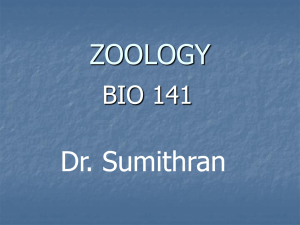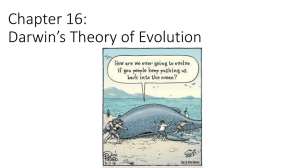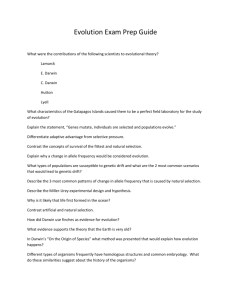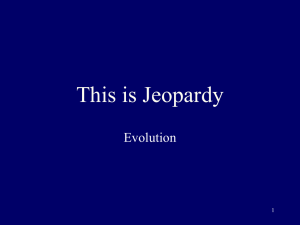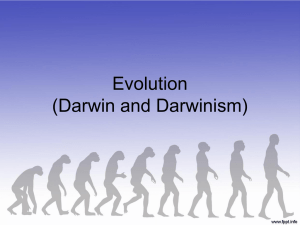Page | Daniel Pinto Dr. Desjardins Phil. 2350 27/02/2012
advertisement
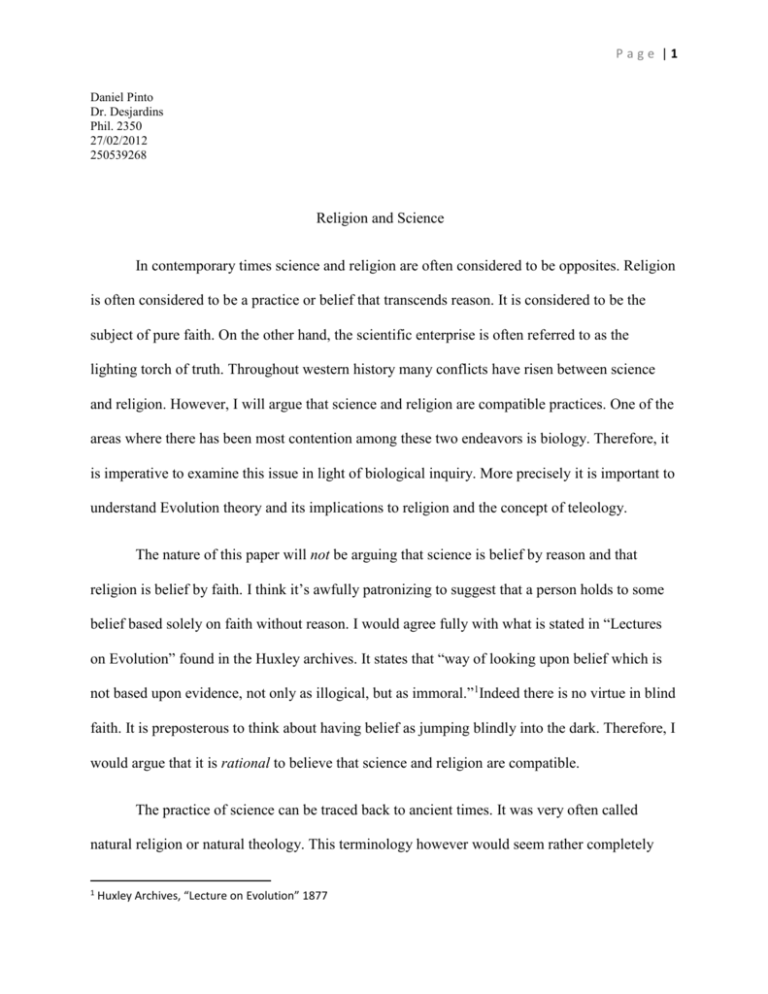
Page |1 Daniel Pinto Dr. Desjardins Phil. 2350 27/02/2012 250539268 Religion and Science In contemporary times science and religion are often considered to be opposites. Religion is often considered to be a practice or belief that transcends reason. It is considered to be the subject of pure faith. On the other hand, the scientific enterprise is often referred to as the lighting torch of truth. Throughout western history many conflicts have risen between science and religion. However, I will argue that science and religion are compatible practices. One of the areas where there has been most contention among these two endeavors is biology. Therefore, it is imperative to examine this issue in light of biological inquiry. More precisely it is important to understand Evolution theory and its implications to religion and the concept of teleology. The nature of this paper will not be arguing that science is belief by reason and that religion is belief by faith. I think it’s awfully patronizing to suggest that a person holds to some belief based solely on faith without reason. I would agree fully with what is stated in “Lectures on Evolution” found in the Huxley archives. It states that “way of looking upon belief which is not based upon evidence, not only as illogical, but as immoral.”1Indeed there is no virtue in blind faith. It is preposterous to think about having belief as jumping blindly into the dark. Therefore, I would argue that it is rational to believe that science and religion are compatible. The practice of science can be traced back to ancient times. It was very often called natural religion or natural theology. This terminology however would seem rather completely 1 Huxley Archives, “Lecture on Evolution” 1877 Page |2 inappropriate and not in accordance with our general notion of science. Indeed science is the practice of empirical inquiry. Inquiry that carries out experiments that is susceptible to our senses. It is more importantly, inquiry and judgments that can be re-tested for confirmation purposes, and not for verification. Scientific revolutions are the cause for great changes and advancements in human civilizations. It is remarkable what science has accomplished in the past decades; from biological discoveries to advancements in theoretical physics and quantum mechanics. One of the most extraordinary discoveries that have changed science permanently is Darwinian biological thought. Prior to Darwin it was very much widely believed that nature had been designed. The combination of complexities and variations found in the study of nature suggested that what we know of nature had been so obviously designed. Then came Darwin and showed that things had not been designed but that indeed it was the product of Evolution by natural selection. Throughout the 1800th century, there was the belief that there were three primary hypotheses for accounting for the origin of nature. 2The term nature of course referred to all living organisms and organic things from plants and vegetables to animals and human beings. One belief that originated from religion, more precisely from the Abrahamic religions, asserted the truth of Creationism as it is accounted for in the book of Genesis. This account suggested that all animals, most notably human beings were created in their present state in a period of six days as opposed to any sort of process of biological evolution. It is important to point out a common error when addressing this issue. Many people quickly assert that because the belief in creationism originated from the bible, therefore the belief is false. This however, would be to commit the genetic fallacy. You cannot invalidate a belief by 2 Huxley Archives, “Lecture on Evolution” 1877 Page |3 showing or disproving the process of how it originated. Even if it is true that a belief originated as a result of reading an erroneous book, that does not prove the belief to be false. The origin of a belief has no epistemic explanatory power. The proposition established by creationist theory is a scientific one, that is, it promotes an account for the origin of biological organisms and thus it cannot be disproved by addressing its point of origin for the given belief. On the other hand, many people raise legitimate scientific objections to the creationist account. This of course produces tension between religion and science. For example, if it is true that God created fish, birds and crawling things in the same span of time, then our fossil records should support that assertion. This however is not the case. We know of not the slightest evidence of existence of birds before the Jurassic age.3However, this should not be a reason to understand religion and science as opposites. The bible should be understood as a theological document and not as scientific propositions. This sort of interpretation is asserted in other parts of biblical text. For example, the bible states that God formed humans in their womb: “For you formed my inward parts; you knitted me together in my mother’s womb”4. This of course is not to be taken literally; indeed most reasonable believers would not. We have clear natural explanations of the process in which fetuses are formed in wombs. In the same manner, when God states that he made men from the dust, this can be understood in terms of a natural process, most probably, Evolution. Another common misunderstanding is that the bible gives an account of the age of the earth that contradicts science. According to modern science the universe is about 13.7 billion years old. The bible does not assert that the world is 6 thousand years old. In matter of fact, the bible does 3 4 Huxley Archives, “Lecture on Evolution” 1877 Psalm 139. 13 Page |4 not make an estimate of the age of the earth at all. It gives a genealogical account of man. This means that if you were to count all the generations given in the bible, it would go back 6 thousand years. However, there is no reason at all to infer that that is the age of the world nor to assert that the genealogy is exhaustive. Interpreters who reach such conclusions are simply reading between the lines of the text. One important proposition to understand is that Evolution theory and Creationism theory are not conceptually opposites of each other. Evolution does not deal with the origin of life nor with the origin of the universe. It is coherent to state that a god could have possibly created the universe and earth and still believe in Evolution. Prior to Darwin, science was very much indeed involved with the concept of teleology. The term comes from the greek word telos which means purpose or end. The productivity and complexity in biology suggested that there was an element of design. It was believed that because biological organisms had a sense of purpose, therefore it was the direct result of a designer. Early Greek philosopher Galen is accredited to have formulated the first intelligent design argument or best known as a teleological argument. The form of the argument consists in analyzing the complexity of an object and the purpose of the object and drawing the inference that the object being analyzed had to have been designed by an agent. The object of analysis for Galen was the human body. It seemed for Galen that the human body was designed with such complexity and purpose that itself was evidence of intelligent design. The concept of purpose is of most importance for the argument. According to Galen “Thus man is the most intelligent of the animals and so, also, hands are the instruments most suitable for an intelligent animal. For it is not because he has hands that he is the most intelligent, as Anaxagoras says, but because he is the most intelligent that he has hands, as Aristotle 9 says, judging most correctly. Indeed, not by Page |5 his hands, but by his reason has man been instructed in the arts” This line of reasoning argues that the reason that man has hands is because he is intelligent. It may seem very arbitrary that hands would necessitate intelligence. However, it is interesting that hands enable or maximize the productivity of intelligence. The intrinsic correlation between these two parts of human beings is evidence of deliberate design. Galen further goes on to argue that hands could not have been made better if changed. This of course seems to be a rather radical claim. It seems easy to imagine our hands being superior, for one, the skeleton frame could have been stronger in order to avoid fractures and at the same time preserve all of its useful properties that Galen asserts. Likewise, in the early 1800s William Paley, a Christian Apologist formulated a teleological argument. He argued that human beings, like watches, were designed with complexity and purpose that it itself was evidence of a creator, like a watch-maker. Galen and Paley have a feature of their argument that is very similar and gave it great explanatory power in their time. These arguments can be traditionally understood to serve as opposition to Darwinian Evolution. In the latter part of the 20th century, Darwinian Evolution thrived as the main theory of biology. The traditional view of teleology, modernly known as Intelligent Design has been widely rejected by most scientists. This is due to the great epistemic explanatory power in natural selection. The Evolution theory offers a more probable explanation for the origin of species and for the diversity among species than classical creationism. Evolution theory as a result is often referred to as a fact. However, this proposition can be widely misleading. Page |6 According to prominent Darwinian Evolutionist Francisco Ayala, there are three definitions that people mean when they refer to Evolution. They can be formulated as follows: 1. Descent with Modification: Living Organisms are descended with changes from earlier organisms. This would also include common decent and speciation. 2. Mechanisms that bring about Evolution. These are often referred to as Genetic Mutation, Natural Selection and many other factors. This is what Ayala refers to as Darwinism. What Darwin discovered. 3. Evolutionary History: Tracing the lineage of biological organisms back in time to reconstruct a universal tree of life that goes back to a primordial ancestor. According to Ayala, the first definition of” Evolution” is what is often referred to as a fact. However, the other two definitions of Evolution are under great dispute among scientists. For example, within the framework of the second definition, we find the great disagreement between prominent biologists Richard Dawkins and Stephen Jay Gould; Dawkins sees evolution as a struggle among gene heredities, where organisms are vehicles for those genes. Gould, a paleontologist shares a different notion of the process. He sees chance as very important, and views organisms as being more important than genes.5Likewise, the extrapolation of micro Evolution to macro Evolution to create a whole tree of life is still much disputed and there is much work left to do. Therefore, it is very misleading to say that Evolution is a fact. It is still theory. Nonetheless, it is a theory that carries much credence. Evolution argues that all species came from common ancestors. Evolution has very descriptive evidence that support this claim; from homologies to geographical distribution of 5 Kim Sterelny, Dawkins vs. Gould , (Cambridge: Icon Books Ltd, 2007), 16. Page |7 species to migratory patterns. For example, one of the most interesting reasons in favor of Evolution found early on, apart from the fossil record is that of the phenomena on oceanic islands. Islands by definition are very limited in their scope of resources and space. This would explain the absence of certain animals; mainly large predators. The ecological system on an island is thus very limited. However, there is a phenomenon that Darwin discusses on the origin of life in islands. The peculiarity is that there are no peculiar terrestrial animals like frogs found on islands that would be fully capable to live on those islands. According to Darwin, there is a plain correlation between the different classes of species that are found on specific continents regardless of the difference of physical or climate conditions among those areas. This is because it is argued that those species on that specific continent have common ancestors that were the original colonist per se. It is important therefore, to understand that species are separated by oceans. Darwin states it plainly “although two areas may present the same physical conditions of life, we need feel no surprise at their inhabitants being widely different.” 6 This is due to the fact that they possibly shared different common ancestors and thus differed greatly. One of the great factors could be the period of times in which these different species have been separated. The longer they have been separated the more organisms will differ. Darwin states that the more important relation is that of the “relation of organism to organism”.7 The relation of the organisms that live on the same continent; the relation of sharing the ecosystem and being under the same mechanical law of natural selection which will bring about the most compelling relations among existing organisms and the surviving ones. Natural selection selects the animals that are fit to survive and passes on the genes onto later generations. This is what is known as the survival of the fittest. Natural selection 6 D a r w i n , C h a r l e s . T h e O r i g i n o f S p e c i e s , 477 7 Ibid, 478 Page |8 as Darwin saw it is a blind and automatic mechanism that allows Evolution to work at the micro level and eventually at the macro level. In the document titled “Criticism on the Origin of Species” found in the Huxley archives, there is an examination about Evolution and its relationship to teleology. The concept of purpose can be very difficult to examine by the nature of the word. Purpose seems to carry the notation not merely of design but of agency as well. In the article it states that teleology is in direct opposition to Darwinian thought. It states “nothing can be more entirely and absolutely opposed to teleology, as it is commonly understood, than the Darwinian Theory.” 8 In the traditional sense of the concept Darwin is not a Teleologist. He asserts that natural selection is a blind, automatic mechanism that brings about evolution. It has and requires no sense of purpose in this framework. Consider the following passage from the article: “According to Teleology, each organism is like a rifle bullet fired straight at a mark; according to Darwin, organisms are like grapeshots of which one hits something and the rest fall wide.” 9 This indeed would seem like a rather accurate depiction of Darwinian biology. Natural selection chooses for lack of better terms the organisms which are better fit at survival to past down their genes. This is what is widely known as decent with modification. The survival of the fittest framework suggests that there will be animals that do not pass their genes down the chain but that are as a result extinct. It seems rather intuitive that an animal that was designed with purpose would not be made to extinct. “For the Teleologist an organism exists because it was made for the conditions in which it is found; for the Darwinian an organism exists because, out 8 9 Huxley Archives, “Criticisms on the Origin of Species” 1864 Ibid. Page |9 of many of its kind, it is the only one which has been able to persist in the conditions in which it is found.” 10In this sense, Darwin would not be considerd a Teleologist. Religion would be rather committed to some type of teleological account since it presupposes an agent. As Kim Sterelny rightly points out in her book “Dawkins vs Gould”, “in a world without a divine engineer, how can complex adaptive structure come into existence? In this view, natural selection is the only answer”11.I would therefore argue that religion and evolution are compatible. Even though teleology in the strictest sense does not seem to be compatible with Darwin, the inference to an agent is consistent with Darwinian thought. Here it is important to distinguish and define what is meant by an agent. Here what is meant by an agent is ultimately defined as a conscious mind, most notably known as God. Teleology is always linked with agency. This is why Paley for example, not only uses his work to give an account for nature, but to infer and prove the existence of an ultimate agent, mainly, God. Nonetheless many see the mechanism of Evolution as incompatible with agency. “For it would be demonstrated that an apparatus thoroughly well adapted to a particular purpose might be the result of a method of trial and error worked by unintelligent agents, as well as of the direct application of the means appropriate to that end, by an intelligent agent” 12. However, agency does not stand in opposition to Darwin and thus science. Evolution is a mechanism that by natural selection produces species better fit for survival. Paley very much used the analogy of a watch to account for the need of an agent. Evolution is a blind and automatic mechanism. Watches are blind and automatic and have been designed. In the same sense there is no logical reason to see evolution and agency as incompatible. 10 Huxley Archives, “Criticisms on the Origin of Species” 1864 Kim Sterelny, Dawkins vs. Gould , (Cambridge: Icon Books Ltd, 2007), 16. 12 Huxley Archives, “Criticisms on the Origin of Species” 1864 11 P a g e | 10 One does not argue away the existence of an agent by proving that there is a mechanism. The more sophisticated the mechanism the more it points towards an agent. When Newton discovered the law of gravity, he did not say “marvelous! I have the law, now I do not need God”. God is an explicator at the level of the agent, not the mechanism. This is a very elementary logical point that is often overlooked. Paley argues in the following manner: “it is a perversion of language to assign any law, as the efficient, operative cause of anything. A law presupposes an agent; for it is only the mode, according to which an agent proceeds. It implies a power, for it is the order according to which that power acts.” 13It does seem to put God as the foundations for natural laws and thus science. For Evolution to have epistemic explanatory power, it does not need an account for the origin of the laws of nature, most notably, the laws of physics or quantum theory. Does that mean that science is being presumptuous since it cannot account for the Natural laws, most notably the laws of physics or quantum theory? It is absolutely not. Science by definition is in the domain of physical laws of nature and does not need justification for metaphysical claims or explanations, for indeed by its very ontology is unable to reach such justifications. This is why it can be logical to postulate that an agent established the laws of physics and divided quantum theory and still adhere fully to Evolution theory. This paper is not meant to prove the existence of an agent or even to suppose that there is one. One is only examining the logical framework. Therefore, it is imperative to examine science and its conceptual relationship with the aspect of religion that postulates supernaturalism. 13 Paley, W. 1809. Natural Theology: or, Evidences of the Existence and Attributes of the Deity. 12th edition London: Printed for J. Faulder P a g e | 11 Before examining Science and its relationship with supernaturalism, it is important to examine the nature of explanation and scientific understanding. As stated before, science is the practice of empirical inquiry. It is a manner to acquire knowledge, not the manner to acquire knowledge. Science is a very effective endeavor that has advanced human knowledge and technology beyond what it was ever anticipated by its first developers. Scientific ontology and its understanding can vary. When science changes its ontology from methodology to Naturalized epistemology, that is, that all knowledge is empirical knowledge, it encounters many conceptual problems. One obvious problem is that presupposes naturalism that is, that nature is all that exists. David Hume was one of the first philosophers to reject supernaturalism and thus uphold naturalism. . He asserts that “ it is still certain we cannot go beyond experience; and any hypothesis, that pretends to discover the ultimate original qualities of human nature, ought at first to be rejected as presumptuous and chimerical”. Hume is presenting naturalism. Indeed he cannot prove supernaturalism does not exist because his inquiry is limited to sense perception. His argument in favour of naturalism is therefore that there is no reason to believe that there is something beyond the natural world. Naturalism asserts that nature is all there is. But by stating that there are no reasons to believe there is something beyond nature does not prove naturalism. Even if Hume rejects the three arguments presented by Descartes, He is still left in an agnostic position where he would have to withhold judgment. To try an analogy; if Hume was a market investor and Descartes presented three weak arguments that the market will go up, and Hume rejected these arguments, he cannot therefore assume that the market will not go up or go down; indeed he has to withhold judgment. The absence of evidence that there is no supernatural is not P a g e | 12 evidence of the absence of supernaturalism. Hume’s naturalism is inconsistent because his naturalism cannot prove itself to be true. Another problem that Naturalized Epistemology faces is its method. If all knowledge is empirical, then all meaningful propositions need to be susceptible to empirical inquiry. Early in the 20th century, there was an attempt to create a method of verification for empirical claims. There are at least two manners in which it failed. The first one is that it could not be justified. Secondly, the application of the principle proved to be merely impossible. The principle of verification stated that every meaningful statement needed to be empirically verified unless it was analytic. The principle of verification however was not analytic nor could it be verified empirically. This was indeed a crucial problem. The other problem was that the principle of verification proved redundant when in practice. The principle was formulated and revised many times in order to accomplish what it was supposed to carry out. It was supposed to keep out statements of metaphysics and ethics and maintain empirical inquiry. However, upon revision the principle seemed to either allow too much as meaningful propositions or allow nothing at all. The verification principle seemed to only allow finite number of observed statements. This proved to be very contentious when regarding the laws of nature which are crucial for science. This was due to the fact that no finite number of statements can ever entail a universal law. Take for instance the fact that the freezing point of water is at around 0 degrees Celsius. Now let X be “all water reaches freezing point at 0 degrees Celsius”. X cannot be justified for the reasons just mentioned, that is, that no finite number of observations can entail that universal statement. However, using Venn diagrams you can infer a negated existential statement from a positive universal statement. Now -X would be verifiable since it would read as “something does not freeze at 0 degrees Celsius” P a g e | 13 which could be verified since it requires a finite amount of observations and thus be meaningful. But in that case, given a classical account of a negation, --X would be false, that is, meaningful. However, --X is equivalent to X, which was earlier deemed as meaningless. It is not widely believed that verification is illusory. The movement thus become much more modest in their ambition and was referred to as the Logical Empiricist. The switch from verification to confirmation theory is one of the main features that separated these two movements. There was also proposed a distinction between language and meta-language. Language was where they principle would be used, that is, the framework, and the meta-language where the language X would be talked about. This can also be associated with the concept of internal vs external questions. One of the leaders of the movement, Rudolf Carnap introduced an important new element into his philosophy called the Principle of Tolerance. This postulated the possibility that there is no uniquely, correct logic or empiricism. The Logical Empiricism theory was thus reduced to a convention. This is the exact status as science as a methodology. It was thus a mere proposal. There was now therefore epistemology developed accounting for metaphysics since this conventional status allowed for the proposal of a metaphysical theory. It was not the case anymore that logic, empiricism and the verification principle were given the status of epistemic principles. In modern times, science is now considered merely a methodology. Nonetheless, it is a fallible enterprise. In the article “Lectures on Evolution” found in Huxley archives, the author opens his exposition of science by stating that “Whatever may be men's speculative doctrines, it is quite certain that every intelligent person guides his life and risks his fortune upon the belief P a g e | 14 that the order of Nature is constant, and that the chain of natural causation is never broken”14Indeed here the author is raising the problem of induction; most notably, the fact that it entails the assumption of the continual uniformity of nature. The reliance on induction for justified beliefs is quite intriguing. According to Hume, induction is not a justified method for beliefs. Let me clarify this point. Hume believes that induction is something that is inevitable in human epistemology, but that it is a method that it is not justified. Hume’s argument against induction is set upon the notion that we by nature make inductive judgments all the time. This indeed rings truth to our intuitions. One makes generalization every so often on the basis of experience from the past, present, and into the future. One relies on the intuitive notion of causality. Yet causality derives from our inductive forms of reasoning. Therefore, Hume argues that one cannot have induction as a means of justification because induction itself cannot be proven and leads to circular argument. Induction is only possible if one can embrace the principle of the uniformity of nature. This asserts that the past will be like the future. That nature will remain the same. Can this principle be proven? It cannot. It cannot be proven deductively and if one tries to prove it by our experience, our sense perception, then we are proving it by inductive inferences which are what the uniformity of nature is trying to establish to begin with. This of course is agonizingly circular. The scientific enterprise therefore has a probabilistic epistemic framework. This is sometimes referred to as Bayesian Epistemology. Induction does seem to work as justification within the framework of science. The focus of course is not on the justification of self-justifying foundations but on the coherence of the whole theory as a whole. The principle of “the inference to the best explanation” or better known as abductive reasoning, is likewise another tool that 14 Huxley Archives, “Lecture on Evolution” 1877 P a g e | 15 science successfully utilizes. When looking at the evidence of the Copernican revolution or Evolution theory, one can still make the inference to the best explanation that suits the evidence. Evolution theory by these tools can acquire much reasonable credibility as has been shown throughout his paper. The naturalistic enterprise of science does not stand in opposition to supernaturalism, or more simply stated, religion. Naturalism is a methodology that is compatible with a supernatural world view. Many people believe that science opposes religion because religion cannot be empirically justified. This of course is a terrible presupposition. I do not mean that supernaturalism is susceptible to empirical inquiry, for by definition, it is not. However, it is a presumption to suggest that one cannot have rational beliefs that are not empirical. There are many beliefs that most of us adhere to that are rational to accept that are not susceptible to scientific inquiry. Naturalism is a methodology but cannot be presumed to describe reality. Science is not omnipotent in this sense. There are many epistemological truths or justified beliefs that precede science. For example, logic and mathematical truths; science presupposes logic and mathematical truths that to try to prove it scientifically would lead to circular argument. Likewise, there are metaphysical truths that are rational to accept like the acknowledgement that there are minds other than one’s own or that the exterior world is real or that the past was not created five minutes ago with an appearance of age. Third, Science cannot account for ethical truths; you cannot prove scientifically that the scientist in Nazi Germany did anything evil as oppose to scientist in the western democracies. And finally, science itself; science cannot be justified by the scientific method. Science is saturated with assumptions that are rational to accept but that cannot be empirically proven. For example, in the special theory of relativity, the whole theory hinges on the assumption that the speed of light is constant in a one P a g e | 16 way direction from any point A and B, but that cannot be empirically proven; one has to assume that in order to hold to the theory. Therefore, it is not charitable to state that because religious beliefs cannot be proven empirically, it is as a result anti-scientific. Science tells us what the regularities that are found in nature are. Supernaturalism tells what is beyond nature. For example, many people believe that the gospels are filled with anti-scientific claims. But then again, nobody is stating that these events happened by natural means. When Joseph found out that his wife was pregnant, he understood the natural reasons behind pregnancies and was going to divorce his wife, until special revelation occurred to change his mind. This indeed is beyond scientific explanations, but that is indeed the point. There is a real sense in which without science, miracles would not be possible. Science tells us the regularities of the laws of nature. If there were people popping from graves all the time, it would not be much of a miracle. But there is nothing incoherent or logically inconsistent by stating that these things happened by supernatural reasons. Indeed there is no reason why to believe that science and religion are incompatible. Each practice has its different domains of inquiry. Science is the empirical study of an intelligible universe. This is indeed is consistent with religion that could believe that the universe is rationally intelligible because there is mind behind it. It is important to understand that science does not confirm supernatural claims since is beyond its domain of inquiry. There is a real sense in which science has its own place different from theological studies. Science can enlighten us with facts about the age of the earth, biological processes such as evolution, and natural laws of physics and still be conceptually compatible with religion. I have most importantly endeavored to show that this synthesis is rational to accept because it violates no rule of logic or reason. P a g e | 17 Bibliography Sterelny, Kim. Dawkins vs. Gould . Cambridge: Icon Books Ltd, 2007 Darwin, Charles . The Origin of Species. United Kingdom : John Murray , 1859 Hume, David . Gutenberg , "A Treatise of Human Nature." Last modified March 15,2011.Accessed February 23,2012.http://www.gutenberg.org/files/4705/4705 -h/4705-h.htm Singer PN (trans.) Selected works by Galen. OUP 1997 Paley, W. 1809. Natural Theology: or, Evidences of the Existence and Attributes of the Deity. 12thedition London: Printed for J. Faulder Huxley Archives, “Lecture on Evolution” 1877 http://aleph0.clarku edu/huxley/CE4/LecE vol.html Huxley Archives, “Criticisms on the Origin of Species” 1864 http://aleph0.c larku.edu/huxley/C E2/CritoS.html


